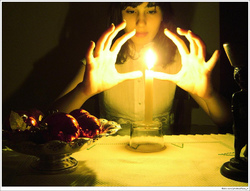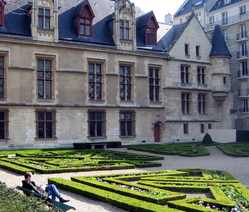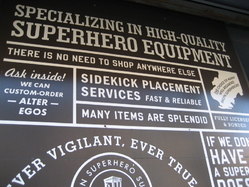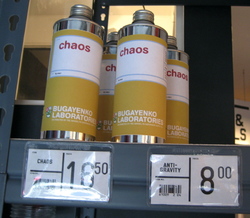Everyone needs a magic box.
Josh Spear had the good fortune to be invited to this year’s TED Conference and shared some of the highlights on his blog, including this quick hit on a talk by J.J. Abrams, creator of the Lost and Alias TV series:
When JJ was very young he was totally into magic and that interest led to his infatuation with creating mystery. During his presentation JJ showed a “secret” magic box he was given as a child that he hasn’t opened yet, and not knowing what’s inside continues to inspire him in what he does today. He said, “mystery is more important than knowledge.”
Mystery over knowledge, I love that. The process of creation depends on flashes of inspiration, moments where you manage to leap out of your usual groove and see things from a new perspective. Whatever knowledge and expertise you may bring to your craft, it’s these moments of fleeting mystery that actually manage to kiss your work with an instant of virtuosity.

You just can’t get there by over-thinking; sometimes it’s more about forgetting. The Centre Pompidou recently had a terrific exhibition of works by Robert Rauschenberg, where I came across this 1962 quote from the artist: “I am trying to check my habits of seeing, to counter them for the sake of greater freshness. I am trying to be unfamiliar with what I am doing.”
Rauschenberg tried to make his own craft a mystery in order to approach it anew every day. How else to create something unconventional? But it’s no easy trick to step out of yourself like that. You have to come up with ways to lure yourself into a creative state of mind, to unclench your brain. You need a magic box.
Conversations over the years with writers, artists, chefs, designers, and programmers have convinced me that creatives rely on rituals and totems to a degree that rivals the superstitions of baseball players. You infuse your work with ritual to coax yourself into a state of flow. The ruse is necessary because the first steps are otherwise so damn painful. Writer Anne Lamott captures the start of the creative workday perfectly:
You put a piece of paper in the typewriter, or you turn on your computer and bring up the right file, and then you stare at it for an hour or so. You begin rocking, just a little at first, and then like a huge autistic child. You look at the ceiling, and over at the clock, yawn, and stare at the paper again. … You try to quiet your mind so you can hear what that landscape or character has to say above the other voices in your mind. The other voices are banshees and drunken monkeys. They are the voices of anxiety, judgment, doom, guilt. Also, severe hypochondria. There may be a Nurse Ratched-like listing of things that must be done right this moment: foods that must come out of the freezer, appointments that must be canceled or made, hairs that must be tweezed. But you hold an imaginary gun to your head and stay at the desk. There is a vague pain at the base of your neck. It crosses your mind that you have meningitis. Then the phone rings and you look up at the ceiling with fury, summon every ounce of noblesse oblige, and answer the call politely, with maybe just the merest hint of irritation. The caller asks if you’re working, and you say yeah, because you are.
This also happens to be a precise description of my state of mind whenever I sit down to write a new section of code. Eventually, of course, I settle in and the ideas start to come, the new thing takes shape. But who wouldn’t want J.J. Abrams’ magic box to make that process go… faster?
Turns out that most of us do have a magic box, a creative totem that helps us get unstuck. It’s that fancy Moleskine notebook that makes you inexplicably excited to trace an idea on its pages. It’s the collection of photos on your desk from the happy days of last summer’s vacation. It’s that Rubik’s Cube that’s as oddly calming as it is maddening. It’s anything that can, for a moment, distract you from the mundane and everyday just long enough for your mojo to kick in and save the day.

Often the magic box is a place: a coffee house, a lakeside bench, a quiet church, a museum gallery… a place where, for whatever reason, answers tend to come.
My magic box is the garden of the Bibliothèque Forney, a design library a few blocks from our apartment. The garden is a tidy pocket park tucked behind the library building, a 15th-century confection of medieval fantasy. It’s a place where Lamott’s banshees and drunken monkeys simmer down. This is an advantage of living in a city that’s been around for more than two millennia: There’s something about going to very old places that lets me put things in proper perspective, see things that I didn’t before.
Many times when I’ve been wrestling with a thorny software-design issue, I’ve slipped over to the Forney garden and the answers have just materialized. Like magic.

Dave Eggers totally gets this kind of magic. The author created a chain of non-profit writing labs called 826 to teach writing to kids. Sounds dry, right? Anything but: Each of these labs is hidden behind a whimsical and utterly cool storefront that doubles as a magic box. I accidentally stumbled across the New York branch during my recent stateside visit: Brooklyn Superhero Supply. (See my flickr photo set.)
The elaborate storefront perfectly mimics a Brooklyn hardware store, except that the advertised items are telepathy blockers, invisible jet planes and “unstable mutation catalysts.” A sign asks visitors, “Please do not use your X-ray vision inside the store.” Browsing the store’s shelves turns up cans of “Chaos” alongside capes, masks, a villain detention cell and gallons of invisibility and omnipotence.
A secret passage in the back leads to the writing lab.

The other outposts of 826 have similarly elaborate fronts. Chicago has the Boring Store, whose window announces that it is “NOT a secret agent supply store,” which of course is precisely what it is. San Francisco has the Pirate Supply Store, and Seattle the Greenwood Space Travel Supply Store.
As a kid, I would have fallen all over myself to go to these writing labs. These are fun, creative spaces that are completely unlike the usual, all-too-dreary school environment. They are escapes.
And that, after all, is what a magic box does. It changes the air in your environment. It turns work into discovery, maybe even adventure, letting you solve mysteries instead of simply wringing knowledge.




